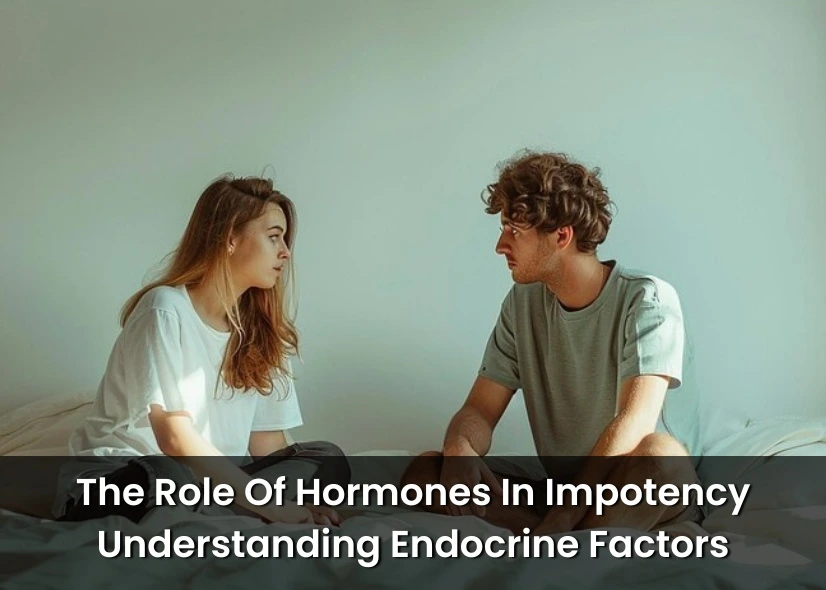Understanding Hormones And Their Functions
Hormones are chemical messengers produced by glands in the endocrine system. They regulate various bodily functions, including metabolism, growth, and sexual health. The primary hormones involved in male sexual function are testosterone, prolactin, thyroid hormones, and cortisol. An imbalance in any of these hormones can lead to ED.
Key Hormones Influencing Erectile Function
1. Testosterone
Role in Sexual Health : Testosterone, the primary male sex hormone, is crucial for libido, sexual arousal, and overall sexual function. It also contributes to muscle mass, bone density, and red blood cell production.
Impact on ED : Low testosterone levels (hypogonadism) can reduce sexual desire and impair the ability to achieve and maintain an erection. Symptoms of low testosterone include fatigue, depression, and decreased muscle mass.
Diagnosis and Treatment : Blood tests can determine testosterone levels. Testosterone replacement therapy (TRT) can restore hormonal balance and improve erectile function in men with low levels.
2. Prolactin
Role in Sexual Health : Prolactin is a hormone primarily associated with lactation in women but is also present in men. It plays a role in sexual satisfaction and refractory periods (the recovery phase after orgasm).
Impact on ED : Elevated prolactin levels (hyperprolactinemia) can suppress testosterone production, leading to decreased libido and erectile dysfunction. Symptoms of high prolactin include gynecomastia (enlarged breasts in men) and galactorrhea (milk discharge from the breast).
Diagnosis and Treatment : Blood tests can measure prolactin levels. Treatment options include medications to lower prolactin levels and, in some cases, surgery to remove a prolactinoma (a benign tumor of the pituitary gland).
3. Thyroid Hormones
Role in Sexual Health : Thyroid hormones, produced by the thyroid gland, regulate metabolism and energy levels. They play a critical role in overall health and well-being.
Impact on ED : Both hyperthyroidism (overactive thyroid) and hypothyroidism (underactive thyroid) can affect sexual function. Hyperthyroidism can lead to increased sexual arousal and premature ejaculation, while hypothyroidism can cause decreased libido and erectile dysfunction.
Diagnosis and Treatment : Thyroid function tests can diagnose thyroid imbalances. Treatment involves medications to regulate thyroid hormone levels, either to decrease overproduction or to supplement underproduction.
4. Cortisol
Role in Sexual Health : Cortisol, known as the stress hormone, is produced by the adrenal glands. It helps the body respond to stress and regulates various bodily functions, including metabolism and immune response.
Impact on ED : Chronic stress and elevated cortisol levels can interfere with sexual function, leading to decreased libido and erectile difficulties. High cortisol can also affect testosterone production.
Diagnosis and Treatment : Blood and saliva tests can measure cortisol levels. Stress management techniques, lifestyle changes, and medications can help regulate cortisol levels and improve sexual function.
Comprehensive Hormonal Evaluation By Dr. Lal
Identifying and addressing hormonal imbalances is crucial in treating erectile dysfunction. At Lal Clinic, we offer a comprehensive hormonal evaluation to determine the underlying endocrine factors contributing to ED. Our diagnostic approach includes:
Detailed Medical History : Understanding the patient’s overall health, symptoms, and lifestyle factors.
Blood Tests : Measuring levels of testosterone, prolactin, thyroid hormones, and cortisol.
Physical Examination : Assessing signs of hormonal imbalances and related health conditions.
Personalized Treatment Plans
Based on the evaluation results, our team of experienced sexologists and endocrinologists develops personalized treatment plans tailored to each patient’s needs. Treatment options may include:
Hormone Replacement Therapy (HRT) : For low testosterone or thyroid imbalances.
Medications : To regulate prolactin and cortisol levels.
Lifestyle Modifications : Including diet, exercise, and stress management techniques.
Psychological Support : Addressing stress, anxiety, and other psychological factors affecting sexual health.
Conclusion: Achieving Hormonal Balance For Better Sexual Health
Erectile dysfunction can significantly impact a man’s quality of life and intimate relationships. Understanding the role of hormones in impotency is vital for effective diagnosis and treatment. At Lal Clinic, we are dedicated to providing comprehensive care that addresses both the physical and psychological aspects of ED.

